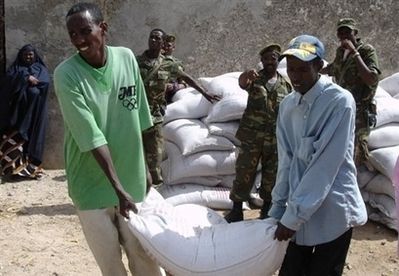|
WFP seeks
urgent navy escorts for Somalia food aid.
(Somalia, July 18,
2008 Ceegaag Online)

The United Nations said on
Friday food shipments to Somalia were grinding to a halt as
few vessels were willing to hazard the country's
pirate-infested waters, and it called on governments to
provide naval escorts.
Peter Goossens, Somalia
director for the U.N. World Food Programme (WFP), said the
agency had received no offers of naval protection since late
June, when a Dutch frigate brought a WFP vessel safely into
Mogadishu.
"I have 80,000 tonnes (of
food) sitting in South Africa to urgently go into Somalia
and so far I've only been able to find one ship of 8,000
tonnes that is willing to do this," he told a news
conference.
"When you speak to shipping
operators or agents, the first question you get is: 'Are
there escorts?'"
Fighting between Somalia's
interim government and Islamist insurgents has triggered a
humanitarian crisis that aid workers say may be the worst in
Africa.
At least a million people
have been uprooted by the violence since early last year,
and their plight has been compounded by record-high food
prices, hyper-inflation and drought.
WFP delivers 90 percent of
its food aid to Somalia by sea. It says air and overland
routes are not practical given the scale of the operation.
Pirates have attacked 24
ships off Somalia's
eastern and northern coasts so far this year, compared with
31 attacks in the whole of 2007.
Goossens said naval escorts
from France,
Denmark and the
Netherlands over the past eight months had been successful
in protecting WFP ships from attack.
WFP expects the total
number of Somalis needing food aid to rise to 3.5 million by
December. It now feeds about 1 million a month, a figure it
aims to increase to 2.4 million by the year end. Other
relief groups would feed the rest.
Goossens said he had only
enough stocks in Somalia to last for five or six weeks.
The United Nations warned
last week that the humanitarian disaster could soon rival
Somalia's famine of the early 1990s, in which hundreds of
thousands died.
"The most nightmarish
situation is that we might see Ethiopia-like pictures of
famine from the 1980s," Goossens said.
He said food had to be
sourced from South
Africa because
traditional suppliers Kenya and Uganda were starting to
limit exports due to rising global food prices.
The United Nations says its
aid requirements in Somalia has jumped nearly 60 percent in
six months to $641 million, due to deteriorating security
and rising prices.
Of that, WFP needs about
$340 million to address the country's growing hunger crisis.
But the food agency says it faces a shortfall of $210
million until the end of March 2009.
Source: Reuters

webmaster@ceegaag.com |

